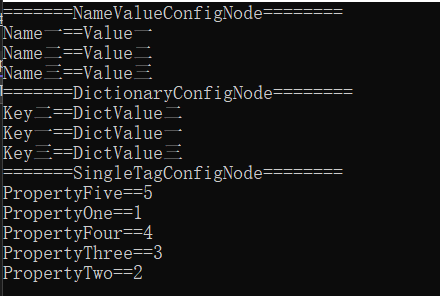C#自定义配置文件(一)
作者:互联网
C#自定义配置文件
.NET程序中,经常使用Config文件来配置应用程序中经常使用的值,比如数据库连接字符串。最近项目遇到一个需要配置好多节点在配置文件中的需求。为了使配置节点整洁易维护,在代码调用时也保证获取时比较直观,结合自定义配置文件专门整理了一个配置文件帮助类Demo。此篇文章主要讲述自定义配置文件的使用方法。
常见配置文件使用方法
- 直接在connectionStrings\appSettings这两个节点中添加add节点配置
- 这种方式在项目中很常见,使用简单,这里不做介绍
- 文件操作
- 很多程序中(自己公司老项目),通过获取指定路径下XML\ini\json\txt等文件,通过IO获取文件内容并对文件进行解析,从而获取程序需要的配置信息(不推荐)
自定义配置文件
在App.Config(web.config)中指定其他配置文件的路径和节点。
在configSections节点下配置section节点,.NET提供自带的类型进行封装。(NameValue键值对、Dictionary字典、SingTag基础结构)。Section节点的name属性是自定义节点的名称,type是接收信息的数据类型。
注意!configSections节点必须为configuration下第一个节点
configSections的name属性为自定义配置节点的名称,type 为转换的类型
ConfigurationManager.GetSection("name")方法的参数是自定义配置文件节点的名称
NameValue键值对
配置语法格式:
<?xml version="1.0" encoding="utf-8" ?>
<configuration>
<configSections>
<!--以NameValueCollection键值对的形式返回配置节点中的信息,type值固定为System.Configuration.NameValueSectionHandler-->
<section name="NameValueConfigNode" type="System.Configuration.NameValueSectionHandler"/>
</configSections>
<!--自定义配置节点-->
<NameValueConfigNode>
<add key="Name一" value="Value一" />
<add key="Name二" value="Value二" />
<add key="Name三" value="Value三" />
</NameValueConfigNode>
<startup>
<supportedRuntime version="v4.0" sku=".NETFramework,Version=v4.8" />
</startup>
</configuration>
调用方法:这里以一个静态属性的方法获取并返回Dictionary格式(后面几种方法也采用这个方式)
/// <summary>
/// NameValueCollection
/// </summary>
public static Dictionary<string, string> NameValueConfigNode
{
get
{
NameValueCollection nvc = (NameValueCollection)ConfigurationManager.GetSection("NameValueConfigNode");
Dictionary<string, string> result = new Dictionary<string,string>();
foreach (string key in nvc.AllKeys)
{
result.Add(key, nvc[key]);
}
return result;
}
}
Dictionary
配置文件语法格式:
<?xml version="1.0" encoding="utf-8" ?>
<configuration>
<configSections>
<!--以Dictionary字典的形式返回配置节点中的信息,type固定为System.Configuration.DictionarySectionHandler-->
<section name="DictionaryConfigNode" type="System.Configuration.DictionarySectionHandler"/>
</configSections>
<!--自定义配置节点-->
<DictionaryConfigNode>
<add key="Key一" value="DictValue一" />
<add key="Key二" value="DictValue二" />
<add key="Key三" value="DictValue三" />
</DictionaryConfigNode>
<startup>
<supportedRuntime version="v4.0" sku=".NETFramework,Version=v4.8" />
</startup>
</configuration>
调用方法:
/// <summary>
/// Dictionary
/// </summary>
public static Dictionary<string, string> DictionaryConfigNode
{
get
{
IDictionary dict = (IDictionary)ConfigurationManager.GetSection("DictionaryConfigNode");
Dictionary<string, string> result = new Dictionary<string, string>();
foreach (string key in dict.Keys)
{
result.Add(key, dict[key].ToString());
}
return result;
}
}
SingTag
配置文件语法格式:
<?xml version="1.0" encoding="utf-8" ?>
<configuration>
<configSections>
<!--基础结构处理 .config 文件中由单个 XML 标记所表示的各配置节点中的值,type固定为System.Configuration.SingleTagSectionHandler-->
<section name="SingleTagConfigNode" type="System.Configuration.SingleTagSectionHandler" />
</configSections>
<!--自定义配置节点-->
<!--注意,只能是单个节SingleTagSectionHandler才能处理,无论有多少个属性都能处理-->
<SingleTagConfigNode PropertyOne="1" PropertyTwo="2" PropertyThree="3" PropertyFour="4" PropertyFive="5" />
<startup>
<supportedRuntime version="v4.0" sku=".NETFramework,Version=v4.8" />
</startup>
</configuration>
调用方法:
/// <summary>
/// SingleTag
/// </summary>
public static Dictionary<string, string> SingleTagConfigNode
{
get
{
Hashtable dict = (Hashtable)ConfigurationManager.GetSection("SingleTagConfigNode");
Dictionary<string, string> result = new Dictionary<string, string>();
foreach (string key in dict.Keys)
{
result.Add(key, dict[key].ToString());
}
return result;
}
}
以上程序通过控制台应用程序测试调用效果如下:
自定义配置文件
以上三种方法,只能读取应用程序的Web.config或者app.config中的配置信息,但是在大多数项目中,业务场景复杂,配置信息更是多到看不过来,所以如果都写在web.config或者app.config中的话,不太美观,也不易维护。
那么有没有一种方法,可以根据需要,配置一个或者多个的config,并且在程序中直接调用使用的方法? (问就是有^_^)
下面举例一种自定义配置文件的写法
配置文件写法:
<configSections>节点下<section>的属性值内容与上面三个方法相同。需要注意的是自定义节点,自定义节点只需要设置configSource属性即可,属性值指向自定义配置文件的路径;
注意:路径必须要写成相对路径。
<?xml version="1.0" encoding="utf-8" ?>
<configuration>
<configSections>
<!--把MyConfigData节点的数据映射到MyConfigData类中-->
<section name="MyConfigData" type="ConsoleApplication.ConfigFiles.ConfigFile,ConsoleApplication"/>
</configSections>
<!--自定义配置节点,configSource指定自定义配置文件的路径(必须是相对路径)-->
<MyConfigData configSource="ConfigFiles\Framework.config"/>
<startup>
<supportedRuntime version="v4.0" sku=".NETFramework,Version=v4.8" />
</startup>
</configuration>
这是自定义的文件内容,
<?xml version="1.0" encoding="utf-8" ?>
<MyConfigData>
<add key="Key一" value="自定义文件一" />
<add key="Key二" value="自定义文件二" />
<add key="Key三" value="自定义文件三" />
</MyConfigData>
程序中的调用方法与上面的方式一致,这种自定义配置文件的精髓在于,不用将所有配置信息都挤在一个文件中,而是根据项目需要合理的分成多个配置,只需要在web.config或者app.config中指定文件路径即可。其他使用方法没有差别
自定义结构配置文件
以上方法为常用的基本配置文件的使用方法,都是使用C#提供的类型进行获取,配置文件的节点需要按照对应格式设置,C#中还有一种可以自定义配置文件格式的调用方法,Config中科自定义节点的结构,然后在程序中需要自定义一个配置文件的类,用于接收自定义配置文件的内容;
其中使用到的类型:
ConfigurationSection、ConfigurationElementCollection、ConfigurationElement、ConfigurationProperty
上面介绍的几种方法基本上已经足够日常使用,此篇文章不在进行介绍自定义格式的写法,后期会根据个人情况(是否懒惰的情况),可能会补充此部分功能,有兴趣可以去了解一下。
写在最后
以上源代码已经放在Gitee上,可自行下载,
https://gitee.com/yang-yong-666/csharp
该项目还包含其他关于C#的帮助类,并且会持续更新!
个人交流QQ:1695690324
原创不易,转载请注明出处
博客园:https://www.cnblogs.com/yangyongdashen-S/
CSDN:https://blog.csdn.net/weixin_44312699?spm=1010.2135.3001.5343
Gitee:https://gitee.com/yang-yong-666
公众号:yi人夕岸
标签:配置文件,Dictionary,C#,result,key,节点,自定义 来源: https://www.cnblogs.com/yangyongdashen-S/p/YiRenXiAn_CSharp_Config_1.html
